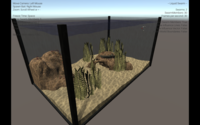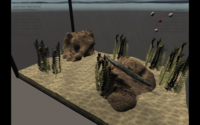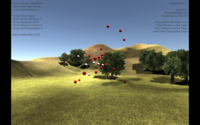Swarm Intelligence
Information for the exam review (Klausureinsicht) can be found here.
Description
In swarm intelligence, we deal with a group of simple and usually homogenous individuals with simple rules. The swarm can achieve a complex and intelligent behavior using local interactions between its members. This collective property can be very well used in technical systems as well as in optimization of complex problems. One advanced application of swarm intelligence is in the area of swarm robotics in which simple small robots can collectively learn to achieve some predefined complex tasks. During this course, the algorithms of swarm intelligence are presented, analyzed and compared. The following topics will be covered:
Part 1: Fundamentals of swarm intelligence
- Swarm stability and stability analysis
- Swarm aggregation
- Swarm in known environments
- Swarm in unknown environments: Particle Swarm Optimization
- Dynamic Optimization
- Multi-Objective Particle Swarm Optimization
Part 2: Swarm and multi-agent systems
- Division of labor and task allocation
- Swarm clustering and sorting
- Ant systems and optimization
Part 3: Applications
- Swarm localization and display
- Swarm robotics
Lecturer
- Sanaz Mostaghim (Course)
- Thomas Seidelmann (Tutorials)
Lectures
The lectures take place: Wednesday 11:00 -12:30 in G29 – 307 (Please note, we start at 11:00)
Slides
- Organization
- Chapter 1: Introduction
- Chapter 2:
- Part 1: Swarm aggregation
- Part 2: Swarm aggregation in known environments
- Chapter 3:
- Chapter 4:
- Chapter 5: Localization Methods in Swarms
- Chapter 6: Swarm Robotics
Recorded lectures
Please refer to http://mediasite.ovgu.de/Mediasite/Catalog/catalogs/iks-si for the recorded lectures. Note: Here you require your URZ account.
You can find the code for Liquid Swarm Simulation: Here



Tutorials:
Please attend the tutorial you have registered for:
| Tutorials | Day | Time and Location | Dates | Saalübung |
| Group 1 - week 1 | Tuesday | 09:15 - 10:45 G29-K058 | 09.01.2018 | 24.01.2018, 11-13 |
| Group 2 - week 2 | Tuesday | 09:15 - 10:45 G29-K058 | 16.01.2018 | 24.01.2018, 11-13 |
| Group 3 - week 1 | Tuesday | 11:15 - 12:45 G29-K058 | 09.01.2018 | 24.01.2018, 11-13 |
| Group 4 - week 2 | Tuesday | 11:15 - 12:45 G29-K058 | 16.01.2018 | 24.01.2018, 11-13 |
In order to be able to write the exam you must fulfill the following criteria:
- Attend all the tutorials
- The assignments will be discussed by students in teams during the first half of the tutorials.
- The solutions of the assignments will be presented by the students in the second half of the tutorials.
- In order to get the permission for writing the exam:
- Each student must present the solution for at least two assignments on two different tutorial days.
- In addition, the students must deliver a list of at least one assignment on 4 tutorial days. With this list, the students inform the tutor about the assignments they are willing to present on that tutorial day. The tutor will select the presenters from the list.
Assignments:
- Assignment: Chapter 2 --> Solutions
- Assignment: Chapter 3 --> Solutions
- Assignment: Chapter 4 --> Solutions
- Exam of WS16/17 - annotated version
- Exam of WS15/16 - annotated version
- Exam of WS14/15 - annotaed version
- Exam of WS13/14
Literature
- Veysel Gazi and Kevin M. Passino, Swarm Stability and Optimization, Springer, 2011
- Eric Bonabeau, Marco Dorigo and Guy Theraulaz, Swarm Intelligence: From Natural to Artificial Systems, Oxford University Press, 1999
- Andries Engelbrecht, Fundamentals of Computational Swarm Intelligence, Wiley 2006
- James Kennedy and Russel Eberhart, Swarm Intelligence, Morgan Kaufmann, 2001
- Zbigniew Michalewicz and David Fogel, How to solve it: Modern Heuristics, Springer, 2001
- Marco Dorigo and Thomas Stützle, Ant Colony Optimization, The MIT Press, 2004
- C. Solnon: Ant Colony Optimization and Constraint Programming. Wiley 2010
- Gerhard Weiss, Multiagent Systems: A modern approach to distributed artificial systems, The MIT Press, 2000
- Christian Müller-Schloer, Hartmut Schmeck and Theo Ungerer, Organic Computing — A Paradigm Shift for Complex Systems, Springer, 2011
